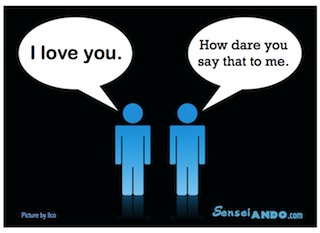I’m going to tell you a story—a ridiculous story—that demonstrates the dangers of bad communication.
Back in high school, I had a classmate whom I shall call Martin. At some point, Martin decided to jump up a notch on the “cool scale” by doing something to impress his buddies. What did he decide to do? To punch me in the face!
Of course, I didn’t know anything about that, until…
One day, I’m walking down the hall. With no warning at all, Martin cut me off and punched me in the jaw. I stumbled back, turned around, and he was just standing there like Clint Eastwood, staring me down.
Did I hit him? No. I fell back on my number one weapon–trash talk. I let him have it. Name-calling, macho posturing, blah blah blah. When I finished my tirade, our two circles drifted apart and we went our separate ways.
Word spread of the incident and before you knew it, the word around the cafeteria was that another fight was coming. That was news to me, because I didn’t want to fight. But fate pushed us together…

You see, Martin and I were both drummers in the marching band. We not only practiced together every morning, we traveled together to perform at parades and football games. And it was during a bus trip to somewhere that a rumor erupted that the big fight was today.
Martin played his part, glaring at me with evil eyes. I played my part, talking trash. Before you know it, the show was over. The marching band spread out in a field behind the busses, making a big circle like a boxing ring. Or circus ring.
This was it. No turning back.
Martin leaned on one hip, eyes half-open, looking calm and cool. I decided to play the role of the crazy warrior. I jumped around, slapped my face, and grunted like a mad dog. Here…we…go…
He sauntered closer. I jumped closer. The fight began.
The good news? I struck first. I kicked Martin square in the stomach–a heavy foot right in his belly. OOF!
The bad news? He caught my foot. Not on purpose. My kick folded him in half. When he bent over, my foot got stuck. He fell back, pulling my foot, and dragged me to the ground.
But wait–more good news! I landed right on top of him, sitting on his chest in a full mount. I couldn’t have planned it better. Martin pushed on me, desperate to get up, but there was no way I could lose. I grabbed his wrists and pinned them to the ground.
The crowd screamed for me to hit him. And I did. But not with my fists…
Instead, I hit him with a speech–a speech I’d been rehearsing for years. I read it in an Iron Man comic book when I was a young lad. That’s right–marching band, comic books, and martial arts. I’m the total nerd package.
In that old comic book, Iron Man defeats his arch-enemy the Mandarin. On the last page, Iron Man hovers above the Mandarin as he stands in the smoking ruins of his destroyed lair, and tells him, “Remember–there was a time Iron Man could have killed you and didn’t! And that he refrained out of strength, not weakness!”

Cool. Iron Man chose to be noble and merciful. And now I had the chance to be just like Iron Man. So, I leaned into Martin’s ear and growled the same message, “Remember– there was a time when I could’ve killed you and didn’t. And I’m doing that out of strength, not weakness.”
Message delivered. The crowd wasn’t happy, but I stood up feeling like a superhero. And for the next month, I didn’t hear a word from Martin.
I won.
Martin eventually broke the silence. We shared the same city bus home. And one day, as the bus approached his stop, I felt him walking up the aisle. He stood right in front me, waiting for the doors to open.
I smiled to myself, reflecting on what a hero I was for letting him live. I almost felt sorry for him. That’s when the door hissed open and Martin—defeated, quiet, sad Martin—punched me in the face and jumped off the bus. Here… we… go… again.
So, what is the moral of this story? There are many. But let’s focus on this one–
Even if you know what you want to say, if you don’t speak the right language, no one will understand you.
How many times have you shared an idea and seen be completely misunderstood? How many times have you given instructions only to see them goofed up? How many times has someone been angry with you for something they said you said, but you didn’t say?
I say bad communication is responsible for 90% of the world’s woes. I worked as a Quality Assurance manager for years, so I spent a lot of time listening to customer complaints. In almost every case, the root cause of the complaint was bad communication–
A contract was misunderstood. A policy was not communicated clearly. A goal was not explained.
Here’s what I learned–even when you know what you want and how to get it, if you’re not speaking the same language as your partners, employees, friends, or customers, you’ll go nowhere. You might even find yourself sliding backward. Or in danger.
Speaking the right language can make the difference between success and failure, life and death.
The first time I got punched by Martin, he spoke with his fist. I answered with trash talk. I chose the wrong language. I know this because even though I delivered the message to leave me alone, he still wanted to fight me. This is classic bad communication.
The second time I faced Martin, behind the busses, I gained the upper hand and delivered the same message–leave me alone. I chose to speak the language of a noble, merciful hero instead of a vengeful beast. And once again, I chose the wrong language. I know this because Martin still felt it was okay to sucker punch me.
Looking back, I should have hit him the first time he punched me. Not because that’s the language I want to speak, but because that’s the language he would understand. (If you’re uncomfortable with the idea of the good guy using violence to solve a problem, read “Your Right to Fight.” )
Violence isn’t always the answer, but playing the hero isn’t always the answer, either! Which is why, last time I checked, Iron Man is still fighting the Mandarin.
So, is there a way to avoid bad communication and become a more powerful, effective communicator? You bet! Here are–
3 Steps to End Bad Communication
STEP ONE: Be clear about what you want. If you don’t know what you want to say, it’s impossible to say it well. That means you need to communicate with yourself.
STEP TWO: Speak up. Deliver your message. Even if you choose the wrong language, it’s better to say something, than nothing. That way, at least you’ll have a chance at getting what you want.
If you’re approached by a mugger, you need to quickly and clearly send a message that you’re not an easy target. If you feel you’re being taken advantage of in a business relationship, you need to send a message you think the deal is unfair and you want something more. If you feel unsatisfied or disrespected in a friendship, you need to send a message detailing what you want and how you want it.
Bottom line–you’re wasting time if you think you’re going to wake up one day and suddenly receive everything you’ve always wanted. Expecting people to guess or magically sense what you want is not a great success strategy. Unless you’re dating a wizard.
STEP THREE: Evaluate the success of your message. If you got what you wanted, great! Make a note of what you did so you can do it again. If you didn’t get what you want, find out why. Yes, some people are stubborn, defiant, or lazy, but it’s also possible they didn’t understand you. You didn’t speak their language.
Make no mistake, learning new languages is vital to getting what you want out of life. But before you focus on learning new languages, make sure you don’t fall into these two traps when speaking the language you already know.

TRAP #1: The belief that everyone speaks the same language. Your message makes sense to you, so you presume it makes sense to everyone. Huge mistake! Always consider how your message can be misinterpreted.
The fact is we all speak different languages. Different words, different tones, different gestures, and different facial expressions. It’s chaos out there! Forget out there–it can even be chaos in your own head!
Frankly, it’s amazing we all get along as well as we do. Think about it–even when we find people who speak our language, look how many misunderstandings still occur! So, here’s the rule–
Take the time to understand others before you expect them to understand you.
TRAP #2: The belief that anyone who doesn’t understand your message is an idiot. How often do you hear yourself saying:
“I’ve told you a hundred times!” “That’s not what I said. Aren’t you listening?” “I don’t why they did that. I sent a memo last week!”
If any of that sounds familiar, it’s possible the only idiot here is you. No offense–I’m an idiot, too! Let’s face facts–if you send a message and don’t get the result you want, then you repeat the same message, the same way, in the same language, that’s not only idiotic, it’s insanity!
Try this instead–the next time you’re not getting the results you want, give everyone the benefit of the doubt. Blame the failure on bad communication. Presume they didn’t understand you because the message was not delivered in a clear enough way.
Apply the same benefit of the doubt when you receive messages. The next time you’re offended or confused by someone’s message, ask them to be more clear. Seek to understand their intention before being distracted by their words. Show people you care about what they have to say by taking the extra time to hear them out. Sometimes that gesture alone will change the tone of the conversation in your favor.
Okay! So, you know what you want to say, you speak up, you avoid all the traps, but you’re still not getting what you want. That means it’s time to learn a new language. The more languages we speak, the better. Here are two ways to turn bad communication into good communication.
The first way to learn a new language is to master your old language. If you haven’t studied how you communicate, there’s a good chance you’re not doing it very well. Take the time to master your tools–your voice, your vocabulary, your posture, your movement. Look at yourself with a critical eye.
Do this–record yourself on video. Video is the most powerful tool we have in this day and age to get a glimpse at how we are perceived by others. Use video to put yourself on the receiving side of your messages.

You want to ask for a raise. So, record yourself walking in, sitting down, and asking your boss for a raise. Watch it back. Would you give yourself a raise?
Imagine you were confronted by a violent attacker. Record yourself taking an aggressive stance and telling him or her to back off. Would you back off?
Record yourself admitting you were wrong and apologizing to a friend. Do you believe you’re sorry?
If you do this exercise, I guarantee that you will be amazed at how often your eyes, your gestures, and your tone, don’t match your feelings! But don’t worry–awareness works wonders to cure bad communication. As you watch yourself on video, you’ll immediately see how to be more effective. And the best part—you can delete the video!
I know, I know–you don’t like watching yourself on video. Well, consider this–if you don’t like watching or listening to yourself, why should anyone else like watching or listening to you?
Be brave. Embrace your voice, your face, your body. Practice with them. Polish them. I believe the better you get at communicating, the more comfortable you’ll be watching yourself.
The second way to learn a new language is to pretend you’re someone else. The only way to learn a new language is to speak it. But until you know that language for yourself, mimicking someone who already speaks the language is the next best thing.
Seek out role models who are already getting what you want. Role models can be people you know, people you don’t know, historical figures, fictional characters, or heck–you can even make up an alter ego!
You’ve heard the phrase, “What Would Jesus Do?” Well, what would Jesus say? How would he say it? Here’s the crazy part–even though we can’t know anything about Jesus for sure, I’ll bet you can still answer those questions. How is that possible? I’ll tell you how…
The question isn’t what would Jesus do, it’s what would the Jesus inside of you do?
If religion makes you uncomfortable, change it to James Bond. How would the James Bond in you interview for a new job? How would Marcus Aurelius handle a bankruptcy? What would that hot trainer at the gym recommend for a midnight snack?
Keep your role models nearby, ready to jump in and guide you any time you need them. It may sound a little kooky, but it’s amazing how quickly you can put yourself aside–your habits and worries–and suddenly start thinking, moving, and speaking someone else. Even an imaginary person!
It’s not that you don’t know how to speak other languages, you just haven’t allowed yourself to do it.
No language spoken by any human can ever really be foreign to you. We’re all human beings. We all share the same emotions. We just reveal them at different times and in different contexts. So, make a list of people you admire and try on other personalities like you’re trying on hats.
Let me be clear–I’m not telling you to pretend to be someone you’re not…
I’m telling you that by pretending to be someone else, you will reveal a part of you that’s real! A part of you that’s been forgotten. Or that you didn’t need until now. Or you’re embarrassed about. Know this–
Until you embrace every part of who you are and everything you’re capable of, you’ll never be fully understood and you’ll never reach your full potential.
Your goal is not to give up being you, it’s to redefine you. To give yourself new tools, strategies, and a new perspective. The big message here is you can learn from anyone. Even people that frighten, offend, or disgust you.
So, start experimenting. Try talking at different speeds, different volumes, and using different words just to see what reactions you get. Good communication skills don’t appear by magic. They require “kung fu”—effort and time.
You wouldn’t wait until you’re dropped off in a foreign country to start learning the local language. In the same way, if you’re a kind, patient person, what are you going to if you find yourself in a situation where you need to be hard-edged and tough? When do you practice those feelings, and speech patterns, and body language to support that image?
If you’re a hot-tempered, aggressive person, when do you practice your compassion and patience? If you’re smart, you’ll take the time to practice the soft, kind-hearted side of your personality, and the loud, assertive part of your personality, and even the ferocious, relentless part of your personality, so you can be the person you need to be in any situation.
Take some time right now. Think about the messages you’re sending today to your friends, your family, your significant other.
What messages are you sending to your competitors your customers, your clients, or the people you serve? Your community? Your children? Keep in mind–
We’re always communicating who we are and what we believe in. Not just with our voices, but with our choices.
By saying this, you’re not saying that. By spending on this, you’re not spending on that. I challenge you to take a look at all the messages you’re sending in everything you do and don’t do.
Start with the messages you’re sending to the people who are the most important to you. Is it clear that you value and appreciate them? Is bad communication causing them to feel neglected or unloved? How can you deliver a clearer message? If it means sending a letter, or picking up the phone, or inviting them out to dinner, do it. Even better–
Take a minute to figure out the language they speak and let them know in a way they’ll understand. Maybe you think flowers is a nice gesture, but they don’t care about flowers. Maybe they want you to spend time with them instead.
No matter what you want, don’t keep it a secret. Speak up. Communicating not only makes what you want clearer for you, it makes it clear to everyone around you. People who can help you.
But remember–the point of all this work is not just for you to get more of what you want, it’s also to empower you to help others get more of what they want.
If you’re a parent, you’ll hear your children’s fears. If you’re a boss, you’ll hear your employees’ frustrations. If you’re a teacher, you’ll know how to present the same material in different ways for different students. Being multilingual is good for everyone.
So, pay attention to the messages you’re sending and evaluate how they’re being received. Keep asking, are you saying what you want to say? Are you being understood more than misunderstood? Is there an area of your life where you feel a gap between what you want to say and what you’re actually saying? Do you need to learn a new language?
It’s easy to get frustrated. It’s easy to give up. But before you do, here’s a final tip–keep it simple. Speak like you’re throwing a punch.
Bad communication is like throwing a wild combination of the wrong moves, at the wrong time, and at the wrong targets. Bad communication is a big swing and a miss.
Communication is most powerful and effective when it’s simple, direct, and from the heart. In business, you may need a 10-page contract filled with small print to explain every policy, deadline, and fee structure. But people are easy…
You don’t need 10 pages of small print to tell someone you love them. Or to back off. Or that you appreciate them. Or that you need help.
Make communication your top priority and you will be empowering yourself to help the people who need your help, receive help from the people who can help you, and protect yourself from being sucker punched along the way.
That’s the language of success.
This article is a summary of the Fight for a Happy Life podcast, “The Language of Success.” Listen to the full episode here.

Very good advice sir! Especially like the idea of “walking a mile in another’s shoes.” Eliminates a lot of problems. You showed much restraint in your dealings with Martin, more than most would have.
About that restraint…for legal reasons, I left out the part where I set his house on fire. 🙂
Thanks for reading, sir!
Once again some pearls of wisdom. Thanks Sensei Ando!
Thank you for saying so! I hope to gather enough pearls to one day make a necklace.
Very nice post. I simply stumbled upon your weblog and wished to mention that I’ve truly enjoyed browsing your weblog posts.
In any case I’ll be subscribing in your rss feed and I hope you write
once more very soon!
Hi Cleveland! Thanks for the support. I’ll keep writing if you keep reading!